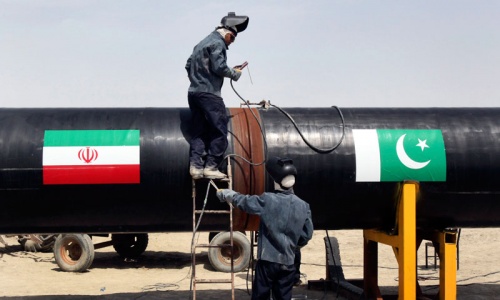TEHRAN: Iran's oil ministry said Wednesday that Pakistan is contractually obliged to complete a major pipeline project which would allow Tehran to export gas to its southeastern neighbour.
The warning came a day after Pakistan's oil minister, Shahid Khaqan Abbasi, said work on the pipeline was not possible because of sanctions imposed by the United States and the European Union on Tehran over its controversial nuclear drive.
“Iran has carried out its commitments ... and expects the Pakistani side to honour its own,” the deputy oil minister, Ali Majedi, said in a statement seen by AFP.
“They should even pick up the pace of work and make up for falling behind schedule” in constructing Pakistan's 780-kilometre (485-mile) side of the pipeline, he said.
Iran, which has the world's second largest gas reserves, says work on its side in the $7.5-billion project launched in 2010 is almost finished.
But the project's fate has faced uncertainty, with Pakistan repeatedly running into problems, including major financing issues, while being pressured by the US.
On Tuesday, Abbasi told AFP that the work on the pipeline “is affected by the sanctions imposed” on Tehran. He did not elaborate on how the sanctions could derail the project.
In Tehran, Majedi rejected the argument, saying the issue of sanctions was not a new development.
“Pakistan faced pressure at the time of signing the deal,” he said. “But fully aware of the situation and the issue of sanctions, it still signed the contract.”
Majedi added that the option of “bringing in a third party to finish the pipeline” had been raised in recent negotiations with Pakistani officials. He did not elaborate.
Iran's Oil Minister Bijan Zanganeh said in late October he had “no hope” for the project, after Islamabad asked Tehran for $2 billion in financing to build its side of the pipeline.
That request was denied by Iran.
Iran currently produces nearly 600 million cubic metres (21.2 billion cubic feet) of gas per day, almost all of which is consumed domestically.
Its only foreign client is Turkey, which buys about 30 million cubic metres of gas per day.
Pakistan is struggling with a severe gas crisis, with natural gas supplies running out in winters, forcing consumers to rely on liquid gas cylinders.














































